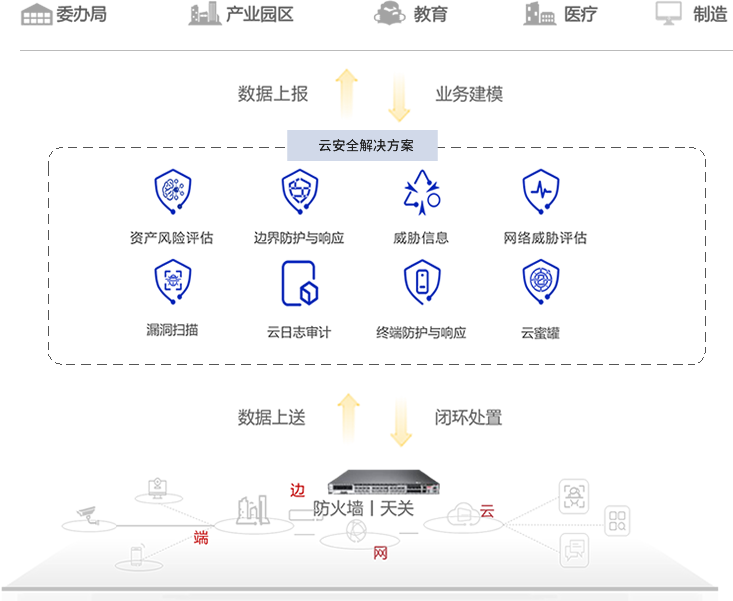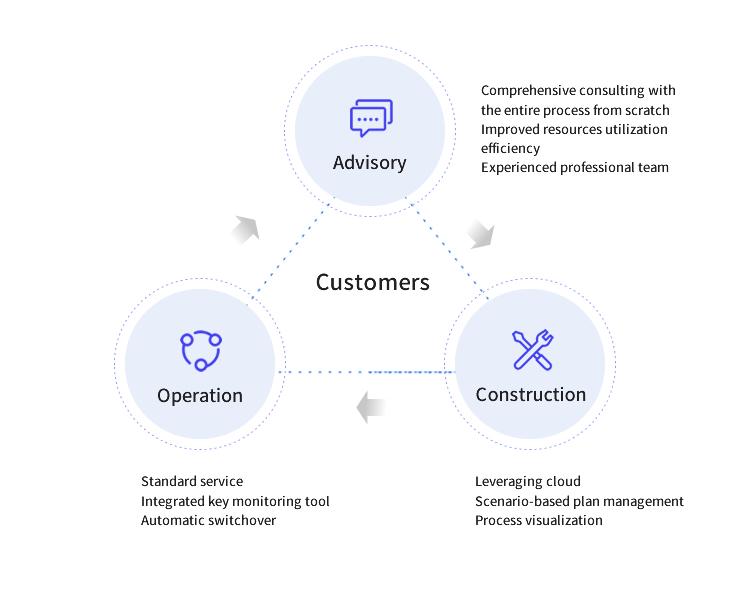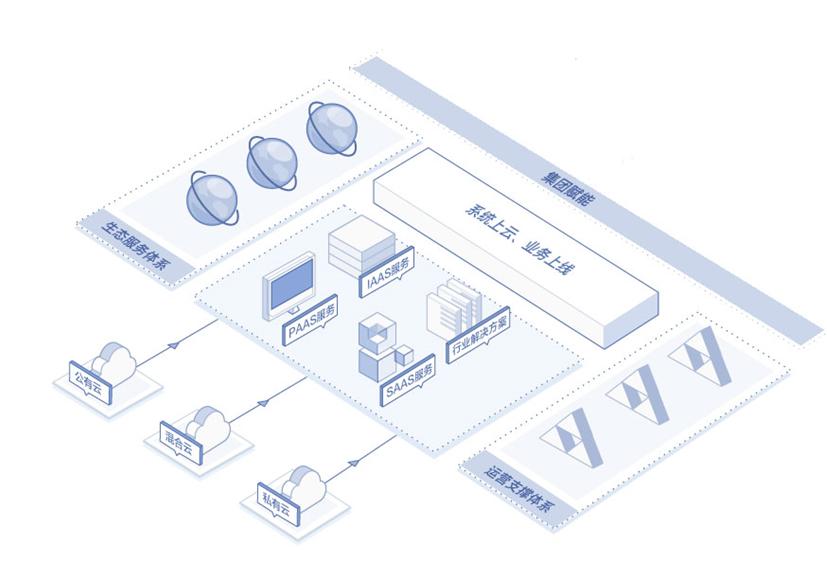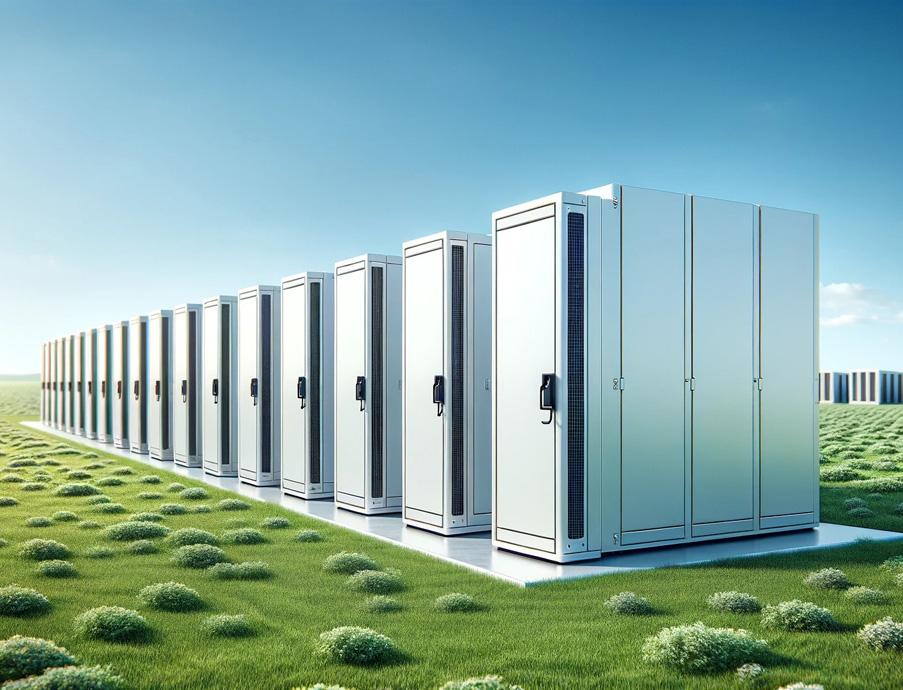Teaming up with industry-leading partners, we have built a robust computing power ecosystem in multiple domains including security, disaster recovery, cloud migration, AI large language models, computing power, and storage power. This ecosystem provides powerful momentum for industrial digitization.

An Integrated Cloud Security Solution from the Cloud to Local
l Providing value-added services to customers, enabling them to utilize their IT resources more effectively and improve their business efficiency.
l Adopting an innovative cloud-to-edge architecture to create a simple, efficient, secure, and reliable cloud-based security service.
What we do
l Selling and leasing hardware, including fire walls and switchers
l Providing personnel on-site services to reduce business costs for customers.
l Safeguarding customers’ network with a customized network security solution
l Providing comprehensive network solutions to help organizations accelerate their digital transformations
l Creating more application scenarios by integrating the Qiankun Cloud service to benefit users from various industries

Advantages
l Eliminating the hardware purchase and maintenance costs associated with building your own data recovery environment
l Eliminating the trouble of maintaining various hardware
l Lower costs by paying for what it consumes
l Owning an abundance of channel resources and solid experiences, as well as the trust of industry-leading companies
l Best practice methodology and experiences
l Exceptional disaster tolerance and switchover capabilities
l Toolkits for data backup and replication
l 24X7 tech support by professional advisory, implementation and operation teams
l Providing optimal connectivity services including dedicated lines for accessing the internet, public cloud, and data center
l Providing high-availability, high-performance, and secure distributed storage and cross-data center storage solutions
l Numerous applications in industries, such as finance and manufacturing
l Provide customized services for organizations with specific needs

Popular Scenarios
l Cloud Essentials
l Site building for SMB
l Increasing workplace efficiency
l Business Security Service
l Business Marketing Service
Advantages
l Technology Empowerment: Leveraging big data and AI technologies to gain insights into the market, drive product innovation, and invent new production models
l “BODADATA + Ecosystem” Empowerment: Working with partners to create multi-scenario application services and comprehensive solutions for the industry
l Platinum service: end-to-end technical support that covers everything from system research to cloud migration to ensure organizations’ smooth cloud transformation

l Power quality assurance: Energy storage systems can smooth out fluctuations in the power grid, providing stable power supply to ensure the normal operation of equipment within data centers and the security of data.
l Enhancing energy utilization efficiency: Energy storage systems can store electricity during low-price periods and utilize it during peak-price periods, thereby optimizing electricity costs and enhancing energy utilization efficiency.
l Improving grid flexibility: Energy storage systems can serve as grid regulators, assisting the grid in managing peak and valley loads, thereby improving grid flexibility and stability.
l Addressing power interruptions: During power outages or emergencies, energy storage systems can provide short-term power support, allowing sufficient time for the safe shutdown or transfer of equipment and services within data centers.
l Supporting renewable energy integration: With the widespread adoption of renewable energy sources such as wind and solar power, energy storage systems can balance the variability of renewable energy, thereby enhancing the integration capacity and the utilization rate.
l Reducing carbon emissions: By utilizing energy storage systems, dependence on fossil fuels can be reduced, leading to a decrease in carbon emissions and contributing to the achievement of goals related to environmental protection and sustainable development.
l Business continuity assurance: For data centers relying on internet services, business continuity is crucial. Energy storage systems can provide uninterrupted power supply, ensuring the uninterrupted operation of critical business and services.
l Boosting economic benefits: Through optimized management of energy storage systems, electricity costs can be reduced, enhancing the overall economic benefits of data centers.

l Cost efficiency: Cold data storage incurs low costs as high-performance and expensive solutions are not required due to infrequent access. Utilizing cold storage can effectively reduce the cost of hot data storage.
l Resource optimization: By migrating infrequently accessed data to cold storage, it’s possible to free up resources on hot data storage, thereby enhancing the performance and efficiency of hot data storage.
l Data retention: Cold data storage solutions can assist organizations in complying with data retention regulations and policies, ensuring that important data is not deleted for a specified period.
l Data backup: Cold data storage can serve as a location for data backup, providing solutions for data protection and disaster recovery.
l Long-term storage: Cold data storage is suitable for storing long-term data such as historical records, archives, and logs, which may be needed in the future but do not require frequent access at present.
l Access efficiency: Cold data storage typically features efficient access mechanisms, enabling quick retrieval of required data even in scenarios involving large data volumes.
l Data security: Cold data storage solutions typically incorporate security measures such as data encryption and access control to protect data from unauthorized access.
l Sustainability: Cold data storage can contribute to environmental sustainability by employing energy-efficient storage technologies, aiding in the realization of green data center goals.
l Flexibility: Cold data storage solutions typically offer flexible storage options that can be adjusted based on data access patterns and business requirements.

l High availability and reliability: Data centers are typically equipped with redundant power supplies, cooling systems, and network connections to ensure highly reliable operations for both office areas and data centers.
l Professional security measures: Offer physical security measures and network security measures.
l Flexible leasing options: Data centers typically provide flexible leasing arrangements, including office spaces of various scales and layouts, to accommodate the needs of different enterprises.
l Plug-and-play IT infrastructure: Office areas rented within data centers typically offer pre-configured IT infrastructure, including server racks, network equipment, and power supplies, enabling businesses to quickly start operations.
l Cost reduction: By leasing office areas within data centers, businesses can avoid high capital expenditures, including construction, equipment, and maintenance costs, and instead adopt an operational expenditure model.
l Business continuity: Data centers are typically designed with capabilities to address natural disasters, power outages, and other emergency situations, ensuring that business operations of enterprises are not severely affected.
l Professional support and services: Office leasing services within data centers often include professional technical support and services to assist businesses in resolving any IT or facility-related issues.
l Collaboration and networking opportunities: Data centers often attract companies from various industries, providing opportunities for enterprises renting office areas to collaborate and establish business connections.
l Environment control: Data centers feature precise temperature and humidity control systems to ensure that servers and office equipment operate under optimal conditions.

